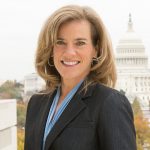
By Holly Hollman, BJC General Counsel
Sex, race and religion are protected categories in federal employment law, which means employers can’t treat employees differently based on sex, race or religion. In various other federal and state statutes, discrimination based on these and other distinct categories may be prohibited. In some anti-discrimination laws, religious entities may be exempted in order to maintain their character and protect the exercise of religion. Religious liberty considerations require that religion be treated in special ways in certain circumstances.
While this quick summary may suggest otherwise, the complex relationship between religion and other protected categories is anything but easy. Theological understandings vary and impact perceptions about what constitutes injustice and unlawful discrimination. That dynamic has been particularly evident in public debates over LGBT rights, which are not explicitly protected in federal law, as well as in recent Supreme Court decisions.
Given the constitutional protection for same-sex marriage and religious exemptions, debates over LGBT rights increasingly have focused on claims of religious liberty. Many advocates believe LGBT discrimination should be treated the same as race discrimination. Some religious objectors consider that assertion inherently hostile to religion.
Fortunately, the separation of the institutions of government and religion promotes equal rights among citizens, while respecting religious diversity. Our constitutional tradition allows us to engage in vigorous debate about the law regarding sex, race and religion, among other issues.
Advocates will continue to fight in legislatures and the courts. In May, the U.S. Supreme Court announced it will review three cases that could result in nationwide protection against discrimination based on sexual orientation and gender identity. Those cases rely on current civil rights laws that protect against sex discrimination in employment. In two cases, the question is whether the prohibition against employment discrimination (“because of … sex” in Title VII of the Civil Rights Act of 1964) encompasses discrimination based on the individual’s sexual orientation. In another case, the question is whether the same law prohibiting sex discrimination implicitly bans discrimination against transgender people.
These cases demonstrate how various claims of discrimination are related and how legal doctrines can develop beyond their legislative origins. The Court may decide that an LGBT employee is protected in similar fashion as someone who claims sex discrimination by providing evidence that “but for” the employee’s sex they would have been treated differently. Likewise, the Court may decide that an LGBT employee’s claim of sex discrimination is similar to a race discrimination case based not on the employee’s race but on the employee’s marriage to someone of another race. If so, an LGBT employee should not
be discriminated against based upon the sex of his partner. The Court may also decide whether an employer’s discrimination against a transgender employee is the same as discrimination against a female employee who allegedly failed to meet expectations of how a woman dresses or acts.
Regardless of the Court’s view in these cases, we should work together to protect LGBT individuals and preserve religious liberty. Even without consensus about how to balance LGBT nondiscrimination and religious exemptions, religious communities should continue to engage in dialogue to understand competing claims and to model civil discourse.
Neither legislatures nor courts will resolve the theological differences about human sexuality that have been so prominent in denominational disputes in recent years. Likewise, we are far from achieving a society that is free from race discrimination. Courts will not end racism or heal the damage it causes.
Diverse religious communities dedicated to protecting religious liberty for all, however, can play a constructive role in public debates that go beyond any “winner take all” legal dispute. Today, religious communities must lead by example to engage in civil dialogue and mediate deep differences of opinion and belief.
Download a PDF of the Summer 2019 issue, or read a digital flip-through version.





